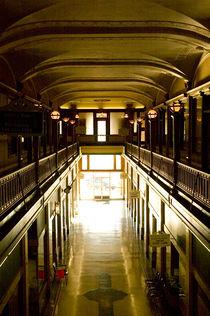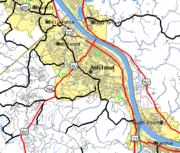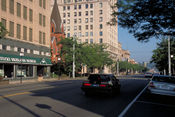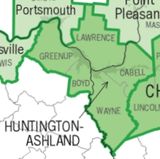Ashland, Kentucky
| City of Ashland, Kentucky | |
|---|---|
| — City — | |
 |
|
| Motto: A proud past. A bright future. | |
|
|
|
| Coordinates: | |
| Country | United States |
| State | Kentucky |
| County | Boyd |
| Settled | Poage's Landing, 1786 |
| Incorporated | Ashland, 1854 |
| Government | |
| - Mayor | Tom Kelley |
| - City Manager | Steve Corbitt |
| Area | |
| - City | 12.2 sq mi (31.6 km2) |
| - Land | 11.1 sq mi (28.7 km2) |
| - Water | 1.1 sq mi (2.9 km2) 9.18% |
| Elevation | 551 ft (168 m) |
| Population (2000) | |
| - City | 21,981 |
| - Density | 1,984.4/sq mi (766/km2) |
| - Metro | 288,649 |
| Time zone | EST (UTC-5) |
| - Summer (DST) | EDT (UTC-4) |
| ZIP codes | 41101, 41102, 41105 |
| Area code(s) | 606 |
| FIPS code | 21-02368 |
| GNIS feature ID | 0486092 |
| Website | http://www.ashlandky.gov/ |
Ashland is a city in Boyd County, Kentucky, United States, nestled along the banks of the Ohio River. The population was 21,981 at the 2000 census. Ashland is a part of the Huntington-Ashland, WV-KY-OH, Metropolitan Statistical Area (MSA). As of the 2000 census, the MSA had a population of 288,649. Ashland is the second largest city within the MSA, after Huntington. Ashland serves as an important economic and medical center for northeast Kentucky.
Contents |
History
Ashland dates back to the migration of the Poage family from the Shenandoah Valley via the famed Cumberland Gap in 1786. They settled upon a homestead along the Ohio River and named it Poage's Landing. It remained an extended-family settlement until the mid-1800s.[1] In 1854, the city name was changed to Ashland, after Henry Clay's Lexington estate, and to reflect the city's growing industrial base.
The city's early industrial growth was a result of Ohio's pig iron industry. It was not until 1854, that growth began to occur with the charter of the Kentucky Iron, Coal and Manufacturing Company by the Kentucky General Assembly.[1] Major industrial employers in the first half of the 20th century included Armco, Ashland Oil and Refining Company, C&O Railroad, Allied Chemical and Dye Company's Semet Solvay and Mansbach Steel.
Geography

Ashland is located at (38.464017, -82.641571).[2]
According to the United States Census Bureau, the city has a total area of 31.6 km2 (12.2 mi2). 28.7 km2 (11.1 mi2) of it is land and 2.9 km2 (1.1 mi2) of it (9.18%) is water.
Cityscape
Ashland's central business district extends from 12th Street to 18th Street, and from Carter Avenue to Greenup Avenue. It includes many historically preserved and notable buildings, such as the Paramount Arts Center and the Ashland Bank Building, which is built to Manhattan height and style standards and serves as a reminder of what Ashland leaders hoped it would become.
Climate
Ashland distinctly experiences all four seasons, with vivid fall foliage and snow in the winter. Average high is 88 °F in July, the warmest month, with the average lows of 19 °F occurring in January, the coolest month. The highest recorded temperature was 105 °F in July 1954. The lowest recorded temperature was -25 °F in January 1994. Average annual precipitation is 42.8 inches (1,090 mm), with the wettest month being July, averaging 4.7 inches (120 mm).
| Climate data for Ashland, Kentucky | |||||||||||||
|---|---|---|---|---|---|---|---|---|---|---|---|---|---|
| Month | Jan | Feb | Mar | Apr | May | Jun | Jul | Aug | Sep | Oct | Nov | Dec | Year |
| Record high °F (°C) | 80 (26.7) |
80 (26.7) |
88 (31.1) |
92 (33.3) |
96 (35.6) |
102 (38.9) |
105 (40.6) |
105 (40.6) |
101 (38.3) |
93 (33.9) |
85 (29.4) |
82 (27.8) |
105 (40.6) |
| Average high °F (°C) | 42 (5.6) |
47 (8.3) |
57 (13.9) |
68 (20) |
77 (25) |
84 (28.9) |
88 (31.1) |
87 (30.6) |
80 (26.7) |
69 (20.6) |
57 (13.9) |
46 (7.8) |
67 (19.4) |
| Average low °F (°C) | 19 (-7.2) |
21 (-6.1) |
29 (-1.7) |
37 (2.8) |
46 (7.8) |
56 (13.3) |
61 (16.1) |
59 (15) |
52 (11.1) |
40 (4.4) |
31 (-0.6) |
23 (-5) |
40 (4.4) |
| Record low °F (°C) | -25 (-31.7) |
-23 (-30.6) |
-8 (-22.2) |
16 (-8.9) |
22 (-5.6) |
30 (-1.1) |
34 (1.1) |
33 (0.6) |
27 (-2.8) |
16 (-8.9) |
2 (-16.7) |
-18 (-27.8) |
-25 (-31.7) |
| Precipitation inches (mm) | 3.23 (82) |
3.07 (78) |
3.78 (96) |
3.33 (84.6) |
4.47 (113.5) |
4.02 (102.1) |
4.68 (118.9) |
3.73 (94.7) |
2.83 (71.9) |
2.81 (71.4) |
3.37 (85.6) |
3.60 (91.4) |
42.92 (1,090.2) |
| Source: The Weather Channel.[3] | |||||||||||||
Demographics
| Historical populations | |||
|---|---|---|---|
| Census | Pop. | %± | |
| 1870 | 1,459 |
|
|
| 1880 | 3,280 | 124.8% | |
| 1890 | 4,195 | 27.9% | |
| 1900 | 6,800 | 62.1% | |
| 1910 | 8,688 | 27.8% | |
| 1920 | 14,729 | 69.5% | |
| 1930 | 29,074 | 97.4% | |
| 1940 | 29,537 | 1.6% | |
| 1950 | 31,131 | 5.4% | |
| 1960 | 31,283 | 0.5% | |
| 1970 | 29,245 | −6.5% | |
| 1980 | 27,064 | −7.5% | |
| 1990 | 23,622 | −12.7% | |
| 2000 | 21,981 | −6.9% | |
| Est. 2009 | 21,287 | [4] | −3.2% |
| U.S. Census Bureau[5] | |||
As of the census[6] of 2000, there were 21,981 people, 9,675 households, and 6,192 families residing in the city. The population density was 766.0/km2 (1,984.4/mi2). There were 10,763 housing units at an average density of 375.1/km2 (971.7/mi2). The racial makeup of the city was 95.84% White, 2.30% African American, 0.12% Native American, 0.39% Asian, 0.01% Pacific Islander, 0.22% from other races, and 1.12% from two or more races. Hispanic or Latino of any race were 0.59% of the population.
There were 9,675 households out of which 26.8% had children under the age of 18 living with them, 47.4% were married couples living together, 13.5% had a female householder with no husband present, and 36.0% were non-families. 33.1% of all households were made up of individuals and 16.0% had someone living alone who was 65 years of age or older. The average household size was 2.23 and the average family size was 2.82.
In the city the population was spread out with 21.9% under the age of 18, 8.0% from 18 to 24, 26.5% from 25 to 44, 23.7% from 45 to 64, and 19.9% who were 65 years of age or older. The median age was 41 years. For every 100 females there were 83.9 males. For every 100 females age 18 and over, there were 79.3 males.
The median income for a household in the city was $30,309, and the median income for a family was $40,131. Males had a median income of $35,362 versus $23,994 for females. The per capita income for the city was $19,218. About 14.0% of families and 18.4% of the population were below the poverty line, including 28.3% of those under age 18 and 12.3% of those age 65 or over.
Government

Ashland is governed by a City Manager form of government.[7] The government switched from a council-manager to a city commissioner-manager form of government in 1950.[8] The City Manager is the chief administrative officer for the city who reports to a Board of Commissioners. Department heads ranging from the Police to Public works report to the City Manager. The City Manager is currently Steve Corbitt.
The Mayor of Ashland is elected for a four year term and is not term limited. The mayor presides over City Commission meetings, is a voting member of the City Commission and represents the city at major functions. The current mayor is Tom Kelley. Kelley is a former member of the Ashland Police Department, where he retired as Chief of Police.
Ashland's current City Commissioners are retired chief of police and current Mayor Tom Kelley, injured in the line of police duty, Officer Kevin Gunderson(Ret.) , Larry Brown,Rev. Marty Gute and Cheryl Spriggs.
In 1925, a new city hall was erected at the corner of 17th Street and Greenup Avenue.[8]
Law enforcement
In the late 1800s, what is now the Ashland Police Department was organized when the town was still known as Poage's Landing.[7] The first executive officer was a town marshal, who was soon replaced by a professional police department.
The city of Ashland currently has 49 sworn officers, three civilian employees who function as administrative support and six parapolice who handle tasks that do not require the services of a sworn officer.[7]
The current Chief of Police is Rob Ratliff who was named Chief May 3, 2007.
Economy

AK Steel
Formed from the merger between Armco and Kawasaki in 1994. A major steel producer.
King's Daughters Medical Center
The fourth largest hospital in the state of Kentucky, the 465-bed not-for-profit institution is the city's largest employer at over 4,000 employees.[9] It offers numerous inpatient and outpatient services for the region.
Another hospital, the Ashland Tuberculosis Hospital, was located on a hill above U.S. Route 60 in the Western Hills section of the city and opened in 1950.[8] It featured 100 beds and served 18 eastern Kentucky counties. It has long since been closed due to the discovery of antibiotics that successfully treat tuberculosis, eliminating its necessity. The facility has been used as the Kentucky State Police Crime Lab for many years.
Education
There are eight public schools and two private schools in Ashland. All public schools within city limits are operated by the Ashland Independent School District.
Ashland has six public elementary schools, those being Hager Elementary, Oakview Elementary, Crabbe Elementary School, Poage Elementary, and Charles Russell Elementary. Hatcher Elementary closed its doors in Spring 2010. Its students and much of its resources will join the other elementary schools in Fall 2010.[10]
There is one public middle school, George M. Verity Middle School, formerly known as Putnam Junior High School. The campus is home to Putnam Stadium which serves as the home field for both the Verity Patriots football and soccer teams, and Ashland Tomcats football. The Ashland Tomcats football program has achieved 11 state championships. The Ashland Tomcats (boys') basketball program have accomplished 1 national championship, 4 state championships, 32 regional championships, and 55 district championships. The Ashland Tomcats and Kittens (girls') soccer teams play at the Ashland Soccer Complex at the high school.
One public high school serves the city of Ashland; Paul G. Blazer High School, named after philanthropist and founder of Ashland Inc., Paul G. Blazer. The high school is home to the Ashland Tomcats and Kittens athletic teams. The school's marching band competes in the AAA class of the Kentucky Music Educators Association(KMEA). The marching band is commonly called "The Pride of Blazer" for its excellent performance in many KMEA marching band competitions.
The two private schools serving the Ashland area are the Holy Family School and the Rose Hill Christian School. Holy Family is affiliated with Holy Family Catholic Church and currently offers K-8 education. Rose Hill is affiliated with the Rose Hill Baptist Church and offers K-12. Post-secondary educational opportunities include Ashland Community and Technical College which has multiple campuses within the city. Morehead State University also has a satellite campus located in Ashland.
Culture
Annual cultural events and fairs
- The Festival of Trees occurs at the Paramount Arts Center every winter.
- Poage Landing Days
- Summer Motion
- Winter Wonderland of Lights
Historical structures and museums

The Paramount Arts Center, an art-deco converted movie theater built in 1930, is located on Winchester Avenue. The theater serves as an important venue for the arts in eastern Kentucky and the surrounding states of Ohio and West Virginia. It is well noted for its Festival of Trees event during the winter season. The Paramount is also devoted to teaching children the importance of the arts. Summer classes are offered for school age children.
Also along Winchester Avenue is the Highlands Museum and Discovery Center. Among its numerous exhibits, includes one about Country Music Heritage that pays tribute to the local music artists that line U.S. Route 23 in Kentucky. Two local artists, The Judds from Ashland, and Billy Ray Cyrus from nearby Flatwoods, are included.
The Pendleton Art Center is also located within the downtown, formed in 2005. Among the art produced there include paintings, stained glass, carved gourds, and wood carvings produced by local artists. They are presented at the Pendleton the first Friday and Saturday of every month and other times by appointment.
The Jesse Stuart Foundation, an organization dedicated to the preservation of the literary legacy of Jesse Stuart and other Appalachian writers, is located within an earshot of the Pendleton Arts Center. Jesse Stuart, a well-known 20th century author, was from nearby Greenup, Kentucky.
Media
Newspaper
Ashland is home to The Independent, a seven-day morning daily newspaper that covers the city and the surrounding metropolitan area. The newspaper is often called "The Daily Independent" by locals, as this was its former name. One of the paper's claims to fame is the first printing of a supposed image of Jesus in the clouds of Korea in 1951.[11]
Radio
| Call sign | Frequency | Format | Description / Notes |
|---|---|---|---|
| W216AT | 91.1 FM | Owned by the American Family Association. | |
| WDGG | 93.7 FM | Owned by Kindred Communications. Licensed to Ashland with studios located in Huntington, West Virginia | |
| WLGC-FM | 105.7 FM | Country Music | Owned by Greenup County Broadcasting, Inc. Licensed to nearby Greenup, Kentucky with studios located in downtown Ashland. |
| WLGC-AM | 1520 AM | Classic rock (specifically music from the 1980s) | Owned by Greenup County Broadcasting, Inc. Licensed to nearby Greenup, Kentucky with studios located in downtown Ashland. |
| WCMI | 1340 AM | The owner is Kindred Communications. It was founded by the Ashland Broadcasting Station whose owners were the Daily Independent on April 29, 1935.[8] It was sold to Nunn Enterprises in 1939. | |
| WYHY | 1080 AM | Located in adjacent Cannonsburg, it is owned by Big River Radio Inc. | |
| WWKO | Operated by the States Broadcasting Company, it went live on July 31, 1954. |
Television
Ashland residents receive their network television primarily from stations in Huntington and Charleston, West Virginia. In addition, WKYT, the CBS affiliate in Lexington, Kentucky is shown on cable in Ashland when its programming is different from the CBS affiliate in Huntington, WOWK. There are also two television stations licensed to Ashland itself. Those are:
| Call sign | Channel | Description |
|---|---|---|
| WKAS | Digital 25 | Owned by the Kentucky Authority for Educational Television. PBS/Kentucky Educational Television affiliate |
| Daystar/WTSF | Digital 44 | Owned by Daystar Television Network |
Parks and outdoor attractions
Ashland boasts a 47-acre (190,000 m2) wooded Central Park, founded in 1854,[1] playgrounds and other amusements. It was bounded between Lexington and Central Avenue, and 17th and 22nd Streets. In 1936, the Works Progress Administration constructed a central road through the park; one year later, a pond was constructed in the southeast quadrant. Twenty years later, after complaints of mosquito problems, the pond was filled in with five feet of dirt and it became a softball practice field.
In the spring of 1995, the pond was excavated and was filled with water by September.[1] The original water lilies that were planned in 1937 had come back in full bloom. A fountain was added in the center and numerous fish species were added. The park today features three separate children playgrounds, several baseball diamonds, a volleyball court and a traditional bandstand. Central Park also hosts an annual holiday light show, the Winter Wonderland of Lights.
In July 1976, a new 10-acre (40,000 m2) park at the former Clyffeside Park was envisioned.[1] Named after Commissioner Johnny Oliverio, it features several baseball diamonds, and is located along Winchester Avenue near 39th Street.
In 2004, the AK Steel Sports Park was constructed along Blackburn Avenue in South Ashland. The sports-oriented park features several baseball diamonds, soccer fields and a skate park.[1]
Transportation

Air
Located just north of the city in Worthington is the Ashland Regional Airport. This airport is used for general aviation and charter services. The then-named Ashland-Boyd County Airport opened in 1953 and featured a 5,600 ft (1,700 m). runway with a 3,000 ft (910 m). clearance.[8]
Tri-State Airport, located in nearby Ceredo, West Virginia, provides commercial aviation services for the city.
Rail
Amtrak, the national passenger rail system, provides service to Ashland. The major and only line that Amtrak offers in Ashland is the Cardinal. Amtrak Service is offered at the Ashland Transportation Center, formerly the Chesapeake and Ohio freight depot located at 15th Street near the Ohio River, but it does not have an Amtrak Ticket Counter or QuikTrak Ticket Machine. The former freight depot, constructed in 1906 on the former Aldine Hotel site,[12] was an abandoned derelict before being renovated in the late 1990s to serve as a unified transportation hub for the city.
The former Chesapeake and Ohio Railway passenger depot at 11th Street and Carter Avenue, was completed in 1925 but abandoned in the 1970s in favor of a downsized depot in Catlettsburg.[8] The rail lines to the building have since been removed and the building itself now serves as the downtown Ashland branch of National City Bank. Passenger rail service was moved from Catlettsburg to the Ashland Transportation Center in the early 2000s.
Bus
Greyhound Lines is the sole provider of intercity bus transportation out of Ashland. It operates out of the Ashland Transportation Center.
The Ashland Bus System provides five local bus routes out of the Ashland Transportation Center.
Roads
Ashland is served by US 23 and US 60, several state routes, and is in close proximity to US 52 and Interstate 64.
Notable natives
- Allison Anders, film director.
- Paul J. Fannin, a former Governor and Senator from Arizona.
- Mark Fosson, musician/songwriter
- Jillian Hall, WWE Diva who was born in Ashland
- Chris Jennings, running back for the Cleveland Browns in the NFL
- The Judds, a country music duo of mother Naomi and daughter Wynonna. The city of Ashland features a public square at 16th Street and Winchester Avenue titled Judd Plaza.
- Ashley Judd is an actress and daughter of Naomi Judd.
- Jim Dallas Crouch is a former Musician and Nashville Booking Agent.
- Matt Wheeler actor MTV's Punk'd
- Although originally from Canton, Georgia, Sonny Landham is an actor and former Kentucky gubernatorial candidate. He currently resides in Ashland.
- Jon Maggard, the renowned chef and frontman for popular acts Like "Rock on Ice" and "ScoutLion"
- Michele Mahone, television host of Weekend Today Show Nine Network Australia.
- Venus Ramey was the first red-haired Miss America in 1944.
- Charlie Reliford an umpire in Major League Baseball.
- Julie Reeves, top 40 hit country music singer.
- Robert Smedley, also known as Bobby Blaze, is a professional wrestler for national and international wrestling organizations including World Championship Wrestling and World Wrestling Entertainment.
- Jean Thomas, proprietress of the American Folk Song Festival in the Ashland area between 1930 and 1972.
- Brandon Webb is a pitcher for Major League Baseball's Arizona Diamondbacks, 2006 National League Cy Young Award winner.
- Chuck Woolery is a popular game show host. A street in Central Park, Chuck Woolery Boulevard, is named after him.
- Country singer Billy Ray Cyrus was born and raised in Flatwoods, KY, a small community just outside Ashland.
- Trace (Neil Timothy) Cyrus, born in Ashland. Ex-Vocalist and ex-guitarist of the band Metro Station.
- David E. Carter, born in Ashland. He is an entrepreneur and writer who is a considered an expert on graphic design, logo design, and corporate branding and the "pioneer" of trademark and logo books.
- Keith Whitley, born in Ashland, Kentucky, but grew up 46 miles away in Sandy Hook
- Matthew Fried, member of The Junior Statesman of America
See also
- List of cities and towns along the Ohio River
- Ashland Commercial Historic District
References
- Historical populations from, "A history of Ashland, Kentucky, 1786-1954". Ashland Centennial Committee. 1954., and "Ashland City Directory." 1985.
- ↑ 1.0 1.1 1.2 1.3 1.4 1.5 "A history of Ashland, Kentucky, 1854-2004." Ashland Bicentennial Committee. 2004. 2 Jan., 2007.
- ↑ "US Gazetteer files: 2000 and 1990". United States Census Bureau. 2005-05-03. http://www.census.gov/geo/www/gazetteer/gazette.html. Retrieved 2008-01-31.
- ↑ "Monthly Averages for Ashland, KY". The Weather Channel. http://www.weather.com/weather/wxclimatology/monthly/USKY0658from=month_bottomnav_undeclared. Retrieved May 23, 2009.
- ↑ Annual Estimates of Resident Population for Incorporated Cities in Kentucky: April 1, 2000 to July 1, 2009 United States Census Bureau. Retrieved on 2010-07-07
- ↑ Historical Census Data Retrieved on 2010-05-15
- ↑ "American FactFinder". United States Census Bureau. http://factfinder.census.gov. Retrieved 2008-01-31.
- ↑ 7.0 7.1 7.2 "Ashland Police Department." Ashland Police Department. 30 Dec. 2006 [1].
- ↑ 8.0 8.1 8.2 8.3 8.4 8.5 "A history of Ashland, Kentucky, 1786-1954." Ashland Centennial Committee. 1954. 2 Jan., 2007.
- ↑ "About KDMC." King's Daughters Medical Center. 31 Dec. 2006 [2].
- ↑ [3], Mike, James. "Goodbye to Hatcher." The Daily Independent. May 30, 2010. Access date: June 5, 2010.
- ↑ [4]
- ↑ Chappell, Edward A. "A historic preservation plan for Ashland, Kentucky." City of Ashland, Apr. 1978. 2 Jan. 2006.
External links
- Chamber of Commerce
- Ashland Area Convention & Visitors Bureau
- Ashland, Kentucky website
- Ashland Fire Department
|
||||||||||||||||||||||||||||||||||||||||||||||||||||||||||||||||||||||||||||||||||||||||||||||||||||||||||||


